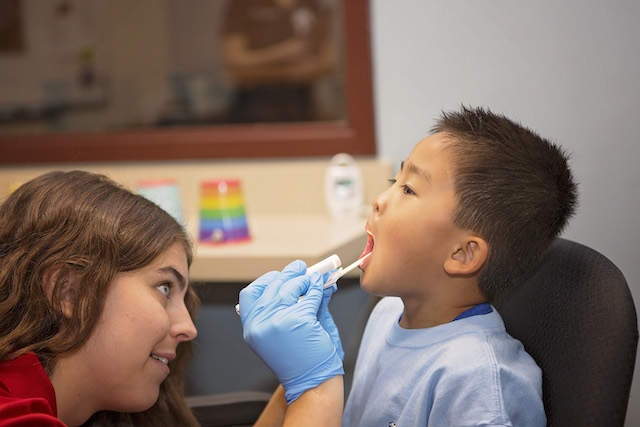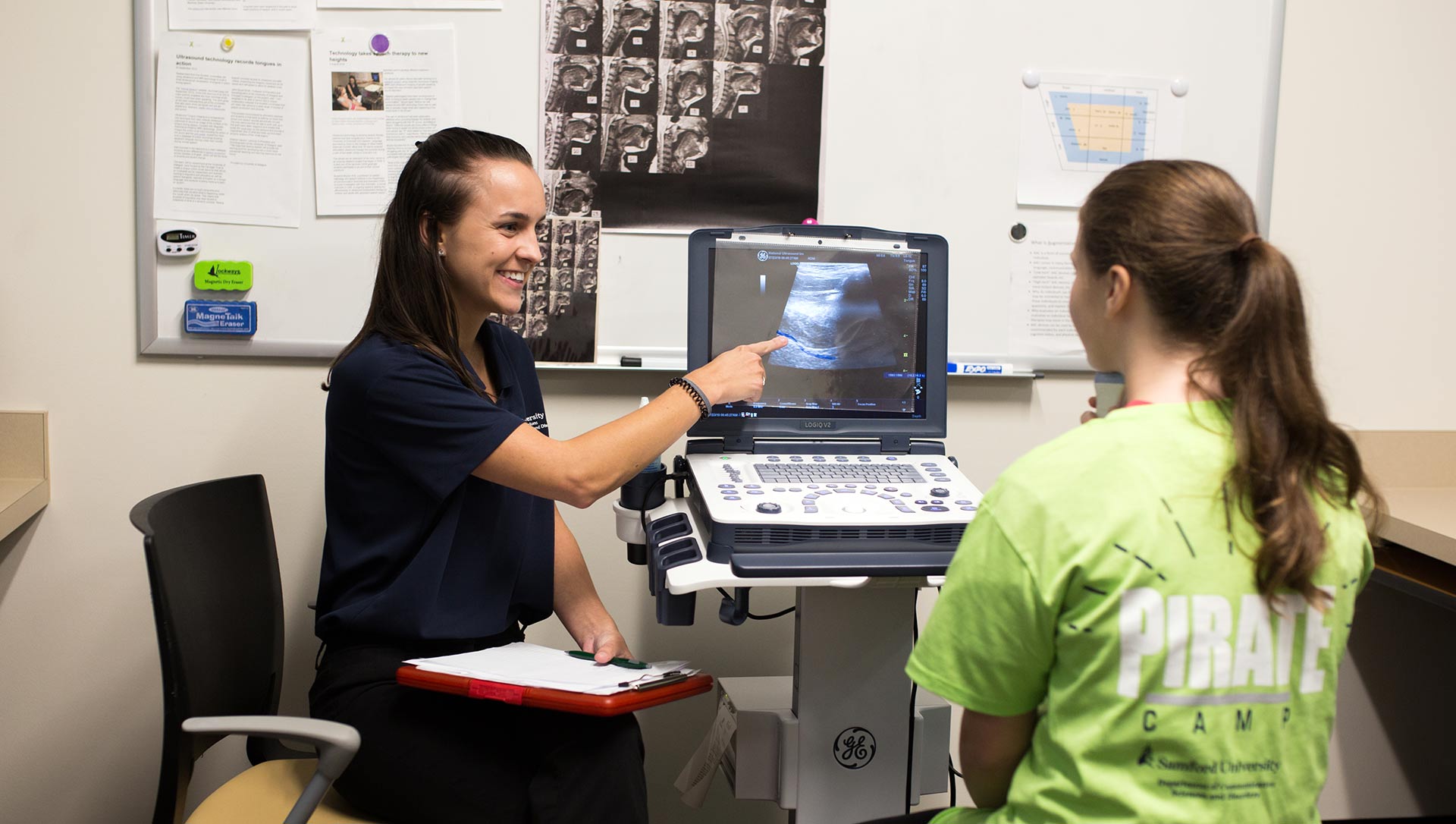A graduate degree aimed to help you answer your calling
We offer this degree program for one reason: to help you become a highly qualified speech-language pathologist with the skills, compassion and motivation to make a difference in your community, wherever you choose to live. We do that through faith-based academic coursework and clinical experiences that are designed to help you reach your career goals, while emphasizing life-long learning, and high moral and ethical competencies. When you graduate, you will be prepared to impact the lives of many people in truly meaningful ways.

Our clinical program is distinct. You will have off-campus clinical practice throughout your time in the program, as well as some on-campus clinical lab experiences with other professionals. More and more, health care is delivered by teams of professionals from various specialties. We’ve structured our program around this type of interdisciplinary collaboration so that your experience is broadened to include other professionals that you may work with during your career.
Application Process
Speech-Language Pathology Admission
CSDCAS Application Opens: July 17, 2023
CSDCAS Application Closes: December 1, 2023
On-Campus Interviews: Mid-January 2024
Entry Month & Orientation: May 2024
Without Background, Speech-Language Pathology Admission
CSDCAS Application Opens: July 17, 2023
Application Deadline: December 1, 2023
On-Campus Interviews: Mid-January 2024
Entry Month: June 2024
The steps below outline the application process for the Master of Science in Speech-Language Pathology program. To apply, you are required to submit both an application through CSDCAS as well as the Master of Science in Speech-Language Pathology Supplemental Form. The link to the Supplemental Form will be e-mailed when your application is submitted. Before starting these applications, we recommend that you complete the following checklist:
- Obtain student copies of your college transcripts to assist you in completing the coursework section for the application.
- Before you begin your application, please review the following CSDSCAS instructions: Before applying, Participating Programs and Instructions & FAQ.
- Request official transcripts from each institution attended by using the transcript request form in CSDCAS. Complete the form, submit it to the registrar's office of each institution attended and instruct them to enclose the form with your official sealed transcript. Transcripts must be sent to the CSDCAS Transcript Department. CSDCAS accepts official transcripts sent directly from the registrar's office only. Please send transcripts as early as possible and no less than four to six weeks before the application deadline due to the time needed by CSDCAS to verify your application.
Send transcripts to:
CSDCAS Verification Department
PO Box 9113
Watertown, MA 02471 - Pay the initial service fee of $100 when submitting the CSDCSAS application.
- Obtain three letters of recommendation from 1) two current or previous professors; 2) clinical supervisor or another faculty. References from family friends and shadow experiences do not meet the criteria. These letters of recommendation must be submitted through CSDCAS. The references should attest to the applicant's academic ability and potential.
- On-campus interview. Information regarding the interview will be sent via e-mail when the application is received.
CSDCAS Customer Service Information
Available Monday through Friday, 9:00-5:00 EST
617-612-2030
csdcasinfo@csdcas.org
For more information regarding the admission process, please contact:
Mary Davis Kennedy
Graduate Recruitment Coordinator
205-726-4775
mkenned8@samford.edu
Admission Requirements for MS SLP
To be considered for the Master of Science in Speech-Language Pathology program, you’ll need to meet the following criteria:
- Possess a bachelor's degree in communication sciences and disorders or speech-language pathology from a college or university that holds institutional accreditation
- Pre-requisite undergraduate courses from an institutionally accredited college or university (ASHA CCC eligibility requirement). All prerequisite courses must have been completed within 10 years prior to application.
- Biological science
- Physical science (must be chemistry or physics)
- Statistics (math, psychology, health sciences)
- Social/Behavioral Science (sociology, psychology, anthropology)
*AP, IB, or CLEP credit will be accepted as pre-requisite courses if the courses are documented on your transcripts and have been accepted by your undergraduate College or University.
- Minimum overall GPA of 3.0 on a 4.0 scale
- Minimum GPA of 3.25 on the last 60 hours of coursework
- Three letters of reference submitted electronically. The three required recommendations should be from 1) two current or previous professors, 2) employer/clinical supervisor. References from family friends and shadow experiences do not meet the criteria.
- On-campus interview. Information regarding the interview will be sent via e-mail once the application is received.
- Undergraduate CSD or major area – no grade in a “major” area less than C
- Students who do not have a background in Communication Sciences and Disorders are encouraged to apply. The plan of study for non-background students is included below.
- International applicants, American citizens or permanent residents who learned English as a second language must score at least 575 (paper) or 90 (internet) on the Test of English as a Foreign Language (TOEFL) or a score of 6.5 on IELTS.
- Upon acceptance, a non-refundable fee of $500 is required to secure admission into the program. The fee is applied to the first semester's tuition.
Exceptions to any admission requirements will be handled on an individual basis.
Students and applicants with disabilities who seek accommodations must make a request by contacting the Section 504/Disability Access and Accommodation Coordinator, 205-726-4078 or disability@samford.edu
Admission Requirements for Non-Traditional MS SLP
Our Non-Traditional Master of Science in Speech-Language Pathology is designed for students who want to pursue a career in Speech-Language Pathology but who do not have an undergraduate background in Communication Disorders. Like our traditional MS SLP program, our goal is to help students become highly qualified speech-language pathologists with the skills, compassion and motivation to make a difference in their communities. We do that through faith-based academic coursework and clinical experiences with an emphasis on evidence-based practices that are designed to help students reach their career goals, while emphasizing life-long learning, and high moral and ethical competencies.
If admitted to the Non-Traditional MS SLP program, your first year will include courses to prepare you for the graduate program. These courses will be completed in your first fall and summer semesters after being admitted. The traditional graduate program will begin the following summer. The full Non-Traditional MS SLP program should be completed in 8 semesters.
To be considered for the Non-Traditional Master of Science in Speech-Language Pathology program, you will need to meet the following criteria:
- Possess a bachelor’s degree from a college or university that holds institutional accreditation
- Pre-requisite undergraduate courses from a regionally accredited college or university (ASHA CCC eligibility requirement). All prerequisite courses must have been completed within 10 years prior to application.
- Biological science
- Physical science (must be chemistry or physics)
- Statistics (math, psychology, health sciences)
- Social/Behavioral Science (sociology, psychology, anthropology)
*AP, IB, or CLEP credit will be accepted as pre-requisite courses if the courses are documented on your transcripts and have been accepted by your undergraduate College or University.
- See the Non-Background Bridge Program Plan of Study below
- Undergraduate CSD or major area courses – no grade in a “major” area less than C
- Minimum overall GPA of 3.0 on a 4.0 scale
- Minimum GPA of 3.25 for the last 60 hours of coursework
- Minimum GPA of 3.0 for math and science coursework
- Three letters of reference submitted electronically through CSDCAS. The three required recommendations should be from 1) two current or previous professors, 2) work supervisor and/or professional colleague.
- On-campus interview. Information regarding the interview will be sent via e-mail once the application is reviewed.
- International applicants, American citizens or permanent residents who learned English as a second language must score at least 575 (paper) or 90 (internet) on the Test of English as a Foreign Language (TOEFL) or a score of 6.5 on IELTS.
- Upon acceptance, a non-refundable fee of $500 is required to secure admission into the program. The fee is applied to the first semester's tuition.
Exceptions to any admission requirements will be handled on an individual basis.
Students and applicants with disabilities who seek accommodations must make a request by contacting the Section 504/Disability Access and Accommodation Coordinator, 205-726-4078 or disability@samford.edu
Admission Statistics
| Reporting Period | Average GPA | Average GRE | Total # of Applications Received | Total # of Students Interviewed | Total # of Students Accepted |
|---|---|---|---|---|---|
|
Graduating Class of 2025 (Admitted Summer of 2023) |
3.78 | 295 | 80 | 63 | 22 |
| Graduating Class of 2024 (Admitted Summer of 2022) | 3.75 | 301 | 93 | 70 | 18 |
| Graduating Class of 2023 (Admitted Summer of 2021) | 3.78 | 299 | 136 | 72 | 22 |
| Graduating Class of 2022 (Admitted Summer of 2020) | 3.60 | 295 | 180 | 72 | 18 |
| Graduating Class of 2021 (Admitted Summer of 2019) | 3.62 | 296 | 195 | 72 | 18 |
| Graduating Class of 2020 (Admitted Summer of 2018) | 3.60 | 296 | 161 | 60 | 18 |
| Graduating Class of 2019 (Admitted Summer of 2017) | 3.48 | 291 | 159 | 60 | 20 |
Student Achievement Data
| Reporting Period | # Completed within Expected Time Frame | # Completing Later Than Expected Time Frame | # Not Completing Program | Total # of Students | % Completed within Expected Time Frame |
|---|---|---|---|---|---|
| Fall 2022-Summer 2023 | 22 | 0 | 0 | 0 | 100% |
| Fall 2021-Summer 2022 | 18 | 0 | 0 | 18 | 100% |
| Fall 2020-Summer 2021 | 17 | 0 | 0 | 17 | 100% |
| Reporting Period | # Employed in the Profession | Total # of Students | Employment Rate in Profession |
|---|---|---|---|
| Fall 2022-Summer 2023 | 22 | 22 | 100% |
| Fall 2021-Summer 2022 | 18 | 18 | 100% |
| Fall 2020-Summer 2021 | 16 | 16 | 100% |
| Reporting Period | # Taking PRAXIS Exam | # Passed PRAXIS Exam | % Passed PRAXIS Exam |
|---|---|---|---|
| Fall 2022-Summer 2023 | 19 | 18 | 95% |
| Fall 2021-Summer 2022 | 19 | 18 | 95% |
| Fall 2020-Summer 2021 | 16 | 15 | 94% |
| Fall 2019-Summer 2020 | 17 | 17 | 100% |
Clinical Practicum Experiences
Students participate in a variety of experiences that help prepare them for careers in speech-language pathology. The Department of Communication Sciences and Disorders maintains relationships with numerous clinical agencies in the Birmingham area as well as various regions of the United States.
Plans of Study
*The Master of Science (MS) education program in speech-language pathology (residential) at Samford University is accredited by the Council on Academic Accreditation in Audiology and Speech-Language Pathology of the American Speech-Language-Hearing Association, 2200 Research Boulevard, #310, Rockville, MD 20850, 800-498-2071 or 301-296-5700.
Complaints against graduate programs accredited by The Council on Academic Accreditation in Audiology and Speech-Language Pathology (CAA) of the American Speech-Language-Hearing Association can be made by following the procedures and guidelines described in the Accreditation Handbook.
Complaints should be submitted to the following address:
Chair, Council on Academic Accreditation in Audiology and Speech-Language Pathology
American Speech-Language Hearing Association
2200 Research Boulevard, #310
Rockville, MD 20850
In accordance with applicable federal and state laws, such as Titles VI and VII of the Civil Rights Act of 1964, Title IX of the Education Amendments of 1972, the Age Discrimination in Employment Act, and the Americans with Disabilities Act and ADA Amendments, the University does not unlawfully discriminate on the basis of sex, gender, race, color, national origin, age, disability, genetic information, veteran status, religion, or any other protected status under federal, state or local law applicable to the University, in its education policies, programs, and activities, in its admissions policies, in employment policies and practices, and all other areas of the University. As a faith-based institution, the University is exempted from certain laws and regulations concerning discrimination.


